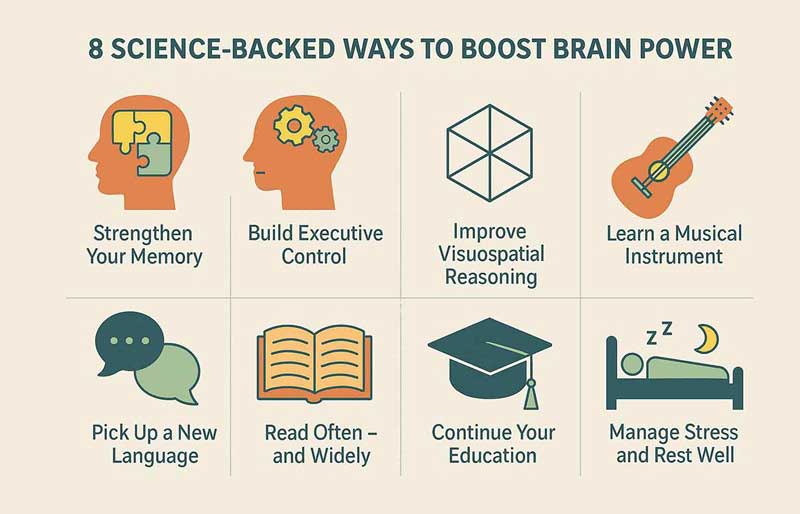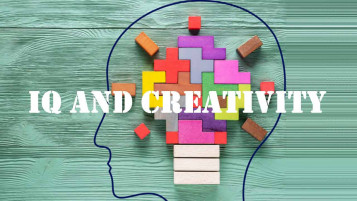If you’ve ever wondered whether it’s possible to raise your IQ, the answer is: maybe with the right kind of mental training and lifestyle habits. IQ, or Intelligence Quotient, measures a set of cognitive skills like reasoning, problem-solving, memory, and verbal comprehension. While your genetic makeup plays a role, research suggests that consistent brain-challenging activities, healthy habits, and ongoing learning can sharpen your mental abilities and even improve your IQ scores.
IQ testing dates back to the early 1900s, popularized by French psychologist Alfred Binet. Today, common standardized tests include the Wechsler Adult Intelligence Scale (WAIS) and the Stanford-Binet Intelligence Scales. These tests compare your performance to others in your age group, offering a snapshot of certain mental skills.
But IQ is just one piece of the intelligence puzzle. It doesn’t measure creativity, emotional intelligence (EQ), or critical thinking directly – all of which also contribute to life success. In fact, factors like health, education access, and environment can influence IQ test results just as much as raw mental ability.
Looking for practical ways to improve intelligence and keep your mind sharp? Research suggests that targeted activities, healthy habits, and ongoing learning can strengthen your cognitive abilities – and even raise your IQ over time.

Memory isn’t just for remembering birthdays, it's a core part of intelligence. Activities like jigsaw puzzles, crossword puzzles, Sudoku, and memory-matching card games challenge both your short-term recall and your ability to see patterns. Studies link memory training to improvements in reasoning and language skills, two areas directly tied to IQ (Brehmer et al., 2012).
Executive control is your brain’s “manager” ; it helps you plan, focus, and make decisions. Games that require strategy and quick thinking, such as Scrabble, Pictionary, and brainteasers, help sharpen these skills. Research shows that stronger executive function often correlates with better performance on IQ tests, especially in problem-solving and logical reasoning sections.
Visuospatial reasoning is the ability to visualize and manipulate objects in space through reading maps, building 3D models, or interpreting diagrams. Activities like mazes, point-of-view puzzles, and working with unfolded 3D shapes can train this skill. One study found that targeted visuospatial training was linked to higher IQ scores in participants.
You don’t have to join an orchestra to get the benefits of music. Even short, regular sessions of learning an instrument can improve memory, focus, and executive function. Research has shown that just 75 minutes of music lessons per week for a few months can raise IQ scores in children – and adults can benefit too (Schellenberg, 2004).
Language learning flexes multiple parts of the brain at once, from memory to problem-solving. The earlier you start, the greater the potential IQ benefits, but even learning as an adult can enhance cognitive flexibility. Try a language app, join conversation groups, or challenge yourself to daily vocabulary practice. This is one of the most effective ways to improve intelligence according to multiple cognitive science studies
Reading boosts vocabulary, comprehension, and critical thinking. For the best mental workout, mix fiction with non-fiction, science articles with opinion pieces, and even poetry. Reading aloud to children has been shown to significantly enhance their cognitive development – a reminder that reading is a brain booster at any age (Mol & Bus, 2011).

Education is one of the strongest long-term predictors of IQ growth. A large-scale review of over 600,000 participants found that each additional year of formal education was associated with an increase of 1 to 5 IQ points. Whether it’s formal classes, online courses, or self-study, keep learning something new.
Stress can drain mental resources, while lack of sleep makes it harder for your brain to store and retrieve information. Meditation, deep breathing, and regular physical activity help keep stress in check (Tang et al., 2007). And aim for 7–9 hours of quality sleep so your brain can consolidate memories and prepare for new learning (Walker & Stickgold, 2006).
Not all “brain hacks” deliver. Simply taking multivitamins or cramming for an IQ test won’t lead to lasting improvements. Real cognitive growth comes from developing fluid intelligence (the ability to think abstractly and solve new problems) and crystallized intelligence (knowledge built over time) through meaningful, sustained activities.
You may not be able to change the genetic blueprint of your intelligence, but you can create an environment where your brain thrives. Memory games, music, languages, reading, and lifelong learning are all proven ways to keep your mind sharp. IQ is just one measure of potential – but giving your brain a regular workout can help you reach more of it.
References:





